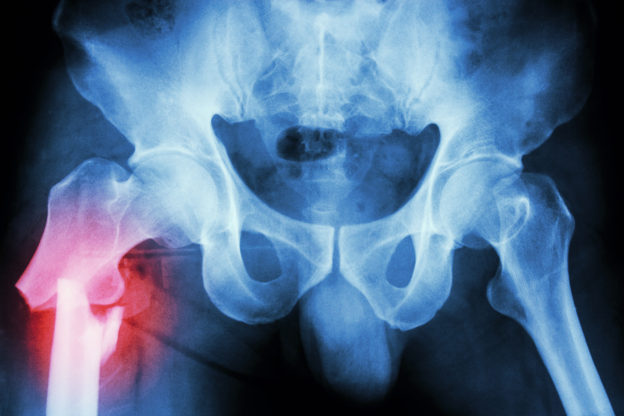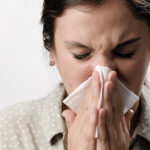By David Blyweiss, M.D., Advanced Natural Wellness
August 17, 2018
- Osteoporosis and hip fractures aren’t restricted to the elderly
- The diet that keeps your bones strong and healthy
- Mineral trio + vitamin duo enhances bone growth and density
As your bones weaken with age, one of the worst things that can happen is that you lose your balance or trip over something, fall down and break a hip.
Now, you may think you’re too young to even consider such an event. But what you may not realize is that your bones reach maximum strength and density around the age of 30. After that, bone mass gradually starts breaking down.
And while most folks believe that hip fractures are restricted to the elderly, that’s not true. In fact, there is not much difference in hip fracture patterns between patients who are younger than 64 and those who are over 85.
How’s that for a wake-up call?
One thing is for sure. It doesn’t matter what your current age is. NOW is the time to start shoring up your bone health so that you can prevent falls and fractures down the road.
You can start with your diet.
Open your arteries, improve blood flow for a new health miracle...
Did you know your circulatory system has over 60,000 miles of arteries, veins and other blood vessels, if stretched end to end?
But as you age, your blood vessels undergo changes, which may cause them to stiffen, thicken and get clogged.
GOOD NEWS! Doctors have now identified a “Miracle Molecule” inside your arteries that helps OPEN your arteries and IMPROVE blood flow.
It’s what Dr. Valentin Fuster calls it, "One of the most important discoveries in the history of cardiovascular medicine."To you, that means...
- Healthy blood pressure
- Sharper mind and memory
- Skyrocketing energy and muscular strength
- Increased pleasure and passion in the bedroom
- Improved circulation to every cell and organ in your body
Go here to discover a new natural way to significantly boost the levels of this miracle molecule in YOUR body NOW!
Can Eating Like a Mediterranean Help Prevent Hip Fractures?
The fact is there is no single food that can protect you from deteriorating bone density.
However, there is a way of eating that can.
Sticking to a Mediterranean diet high in fruit, vegetables, nuts, olive oil and fish – but low in dairy products and meat – can reduce hip bone loss within just 12 months.
In particular, eating like a Mediterranean while supplementing daily with vitamin D helps reduce the rate of bone loss at the femoral neck in people with osteoporosis. (This is the area that connects the shaft of the thigh bone to its rounded head. And it’s the place fractures commonly occur after minor falls.)
There is good reason a Mediterranean style diet works so well to protect your bones. Not only is it abundant in bone-building nutrients, it also encourages the nutrients to work synergistically for better absorption.
Mineral Trio + Vitamin Duo Enhances Bone Growth and Density
Calcium, potassium and magnesium are three critical nutrients that are absolutely necessary for bone mineralization density.
The World's Quickest Solution for Ending Prostate and Urinary Misery
This has recently been revealed to be one of the only real breakthroughs in prostate health.
The seeds of a strange fruit (sometimes called "Chinese Apples") hold powerful phytonutrients that are a revolution in prostate health.
In fact, UCLA and Veterans Administration research have now proved this to be true.
Not only that, but it may be the worlds quickest solution for ending prostate misery.
Simply stated, these phytonutrients represent a huge step beyond beta sitosterol, saw palmetto, and other phytosterols alone.
Simply click HERE if you want to have fast prostate relief...restful, uninterrupted sleep...no more constant "urges to go"...enhanced virility...and optimal prostate support for life.
About 99% of the calcium in your body is stored in your bones and teeth. So getting plenty of calcium is a no-brainer. But pasteurized and processed dairy products aren’t the way to go.
You’re much better off getting your calcium from healthier food sources like broccoli, kale, turnip greens and arugula. Calcium is also found in canned sardines and canned salmon.
Magnesium is another important bone-boosting mineral. It works by increasing the activity of bone-forming cells for strength and density. You can get plenty of magnesium by eating fresh, whole foods like green leafy vegetables, avocados, bananas, nuts, seeds and beans. Some types of fatty fish, like wild caught Alaskan salmon, are also good sources of magnesium.
The third mineral you need to feed your bones with is potassium. In a nutshell, it neutralizes the leaching of calcium from your bones. Eating avocados, cantaloupe, artichoke, mangoes and pears are all excellent ways to get more potassium in your diet.
I don’t know if you noticed or not, but all of these foods fit very nicely into the Mediterranean style eating pattern that I consistently recommend you eat for excellent health, superior brain function and increased longevity. This is just another benefit to add to the list.
Still, if you feel you can’t get enough of these minerals in the foods you eat, you can always opt for supplementation.
In that case, I suggest taking between 4,000-4,500 mg of potassium, 5 mg of magnesium per pound body weight and 1,000 mg of calcium citrate each day. (Take these minerals in divided doses twice a day.)
It’s also important to make sure you are getting plenty of vitamin D3 and vitamin K2.
Both of these can be hard to get enough of, and for good reason. You absolutely cannot get adequate amounts of vitamin D in your diet (it comes from the sun). And K2 is found mostly in foods that we don’t eat much of.
Still, they are each necessary for bone metabolism and remodeling. So in both of these situations, supplementation is your best choice.
Look for a vitamin D3 supplement in the form of cholecalciferol and take 2,000 to 4,000 IU daily to maintain sufficient levels if your lab values are between 30-50 ng/ml, more if you’re below 30 ng/ml.
The best Vitamin D3 supplements already have vitamin K2 in them. But if for some reason yours doesn’t, supplement with 45 to 100 mcg of K2 (menaquinone) each day to cut down on bone loss and improve mineral density. And put some mild stress on those long bones by walking for 30 minutes somewhere, on a treadmill or even around the block.
SOURCES:
Feskanich D, et al. Milk consumption during teenage years and risk of hip fractures in older adults. JAMA Pediatr. 2014 Jan;168(1):54-60.
Feskanich D, et al. Milk, dietary calcium, and bone fractures in women: a 12-year prospective study. Am J Public Health. 1997 Jun;87(6):992-7.
Jennings A, et al. A Mediterranean-like dietary pattern with vitamin D3 (10ug/day) supplements reduced rate of bone loss in older Europeans with osteoporosis at baseline: results of a one year randomised controlled trial. The American Journal of Clinical Nutrition, 2018.
Seiquer I, et al. A Mediterranean dietary style improves calcium utilization in healthy male adolescents. J Am Coll Nutr. 2008 Aug;27(4):454-62.
Castiglioni S, et al. Magnesium and Osteoporosis: Current State of Knowledge and Future Research Directions. Nutrients. 2013 Aug; 5(8): 3022–3033.
Lambert H, et al. The effect of supplementation with alkaline potassium salts on bone metabolism: a meta-analysis. Osteoporos Int. 2015 Apr;26(4):1311-8.
Plaza SM, et al. Vitamin K2 in bone metabolism and osteoporosis. Altern Med Rev. 2005 Mar;10(1):24-35.







